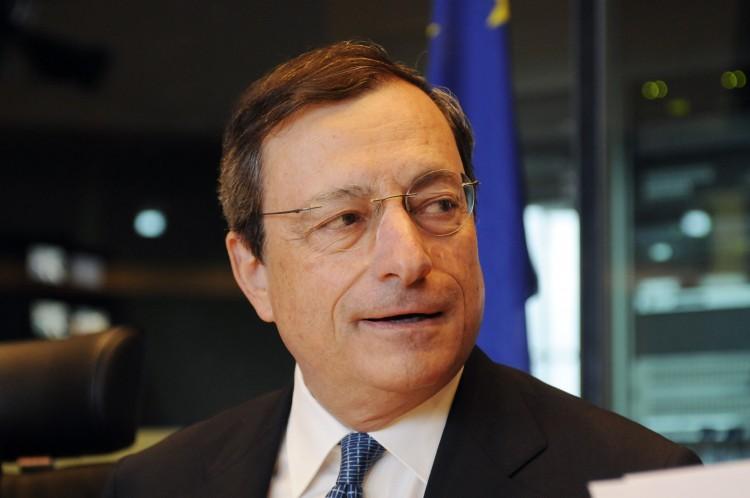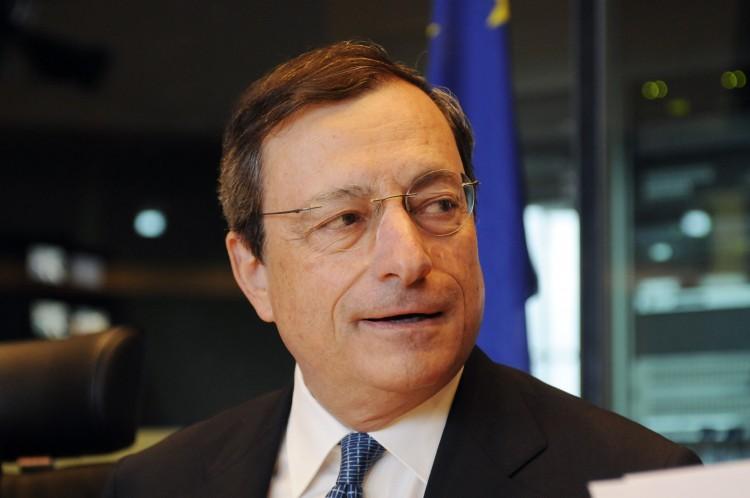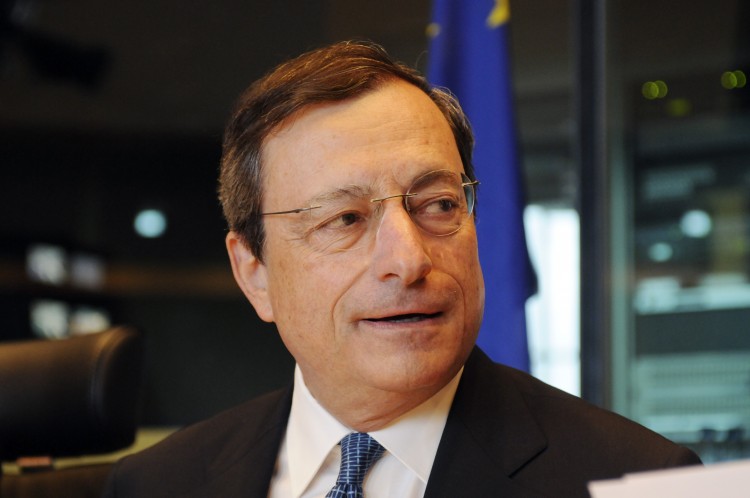It has previously been noted that markets respond especially well to central banks as politicians have mostly lost all their credibility, and last week provided another example of how policymakers can influence financial markets.
So when European Central Bank (ECB) President Mario Draghi spoke on July 26 at an investment conference in London and hinted at potential easing, markets across the globe soared.
The euro common currency gained 60 percent last week, closing at $1.23 Friday. The currency pair had a volatile trading session on Friday when it almost hit $1.24 in the morning, but then crashed down to below 1.23 after some remarks by German officials that contradicted Draghi’s statements.
The Dow Jones EURO STOXX equity index rose to 2,301 points, gaining 1.87 percent last week. Stocks were more volatile early in the week as only a short-selling ban instituted in Italy and Spain helped stocks recover from very depressed levels last Monday.
Draghi Reassures Markets, Hints at Unconventional Measures
The ECB president used strong words last Thursday, which were well received by the markets: “Within our mandate, the ECB is ready to do whatever it takes to preserve the euro. And believe me, it will be enough.”
He also noted that if too high sovereign bonds yields are disrupting the policy transmission of the ECB, it would be in its purview to address the problem—a welcome hint, which resulted in lower peripheral bond yields across the board. The Spanish 10-year benchmark’s bond yield fell to 6.74 percent, after having traded as high as 7.6 percent during the week.
These deliberately vague remarks prompted economists to speculate that the ECB will use unconventional measures, such as quantitative easing (QE), to stem the crisis.
Chief European economist at Mizhuo International in London, Riccardo Barbieri Hermitte, explained the different options in a note to clients.
The traditional methods would be extending the Securities Markets Program (SMP), in which the central bank buys, for example, Spanish and Italian bonds and sells German bonds without an expansion of its balance sheet. This would bring down yields on Spanish and Italian bonds.
Another option would be launching another long-term refinancing operation (LTRO) where banks could pledge shorter-dated sovereign bonds as collateral for cash at the ECB for the duration of three years. At the beginning of the year, the central bank had already expanded its balance sheet by 1 trillion euros ($1.23 trillion) through this method, according to ECB data.
Both of these methods are different from QE that the Federal Reserve undertakes, which Hermitte would prefer: “LTROs came at the cost of saddling the banking systems with large holdings of government securities. QE, on the other hand, would see the ECB increasing its portfolio of ‘peripheral’ bonds and the banks enjoying a welcome liquidity injection.”
German Officials Dampen Enthusiasm
Draghi made these comments unilaterally and he must know that some of his suggestions run against positions held by certain ECB council members and certain countries such as Germany.
Hermitte interprets the bold move like this: “The importance of Draghi’s remarks is that they suggest that he has either convinced the German members of the ECB that it is time to intervene verbally, and if necessary follow through with actual intervention, or he is willing to risk a showdown knowing that a vast majority of the council will support him.”
This showdown might have uncomfortable consequences for the president, however, as numerous denials from different sources came flooding in last Friday which sent the euro on a rollercoaster ride. The Wall Street Journal quoted an unnamed source saying that “many ECB members [were] surprised by Draghi’s comments suggesting new bond buys” and also quotes a spokesman of the German central bank (Bundesbank) that it has not changed its stance on bond buying and remains “opposed” to further purchases by the ECB.
Since German Chancellor Angela Merkel was away on vacation last week and could not intervene personally; it was up to her finance Minister Wolfgang Schäuble to pour cold water over Draghi’s plans via a pre-released interview with the weekly newspaper Welt am Sonntag. When asked about whether there would be renewed buying of Spanish bonds he said that this “speculation has no substance” and that the current package for Spain is “big enough.”
It has long been the position of the German government that countries in danger must be supported but not be written a blank check. This is why Germany has always insisted that countries hoping to receive help must also implement economic reforms and cut spending to get back on a healthy sustainable track.
High Expectations
No matter what Draghi originally planned to do, the market expects something at next week’s council meeting: “Draghi is damned if he does and damned if he doesn’t,” says Carsten Brzeski, a senior economist at Dutch bank ING. “He maneuvered himself into an extremely difficult situation. Expectations are very high.”
The Citigroup economics team on the other hand believes that Draghi deliberately used a type of verbal intervention to move markets up, but might not actually deliver:
“We expect the ECB to engage more on open-mouth policy than they did before, but we think it is premature to see ECB delivering in Aug.1 The additional ECB measures are likely to include multiyear LTROs … and could also extend to a reactivation of [bond buying]. In our view, only if there was a request from Spain … and Italy for [official] assistance for the sovereign, would the ECB be willing to use the [bond buying] program again.”
The Week Ahead
Before the ECB meeting Thursday, the world will likely see different headlines coming out of different corners of the eurozone, so volatility, especially in the euro, is going to be high. This trend will be amplified by the fact that the Fed will announce its monetary policy next Wednesday, just a day before the ECB does.
Apart from central bank policy decisions, there will be a few economic datapoints worth watching, but likely to be ignored due noise generating headlines revolving around policy decisions.
The eurozone will report unemployment figures and consumer confidence. Germany will report retail sales and the forward-looking Purchasing Manager Index level of economic activity.
The Epoch Times publishes in 35 countries and in 19 languages. Subscribe to our e-newsletter.







